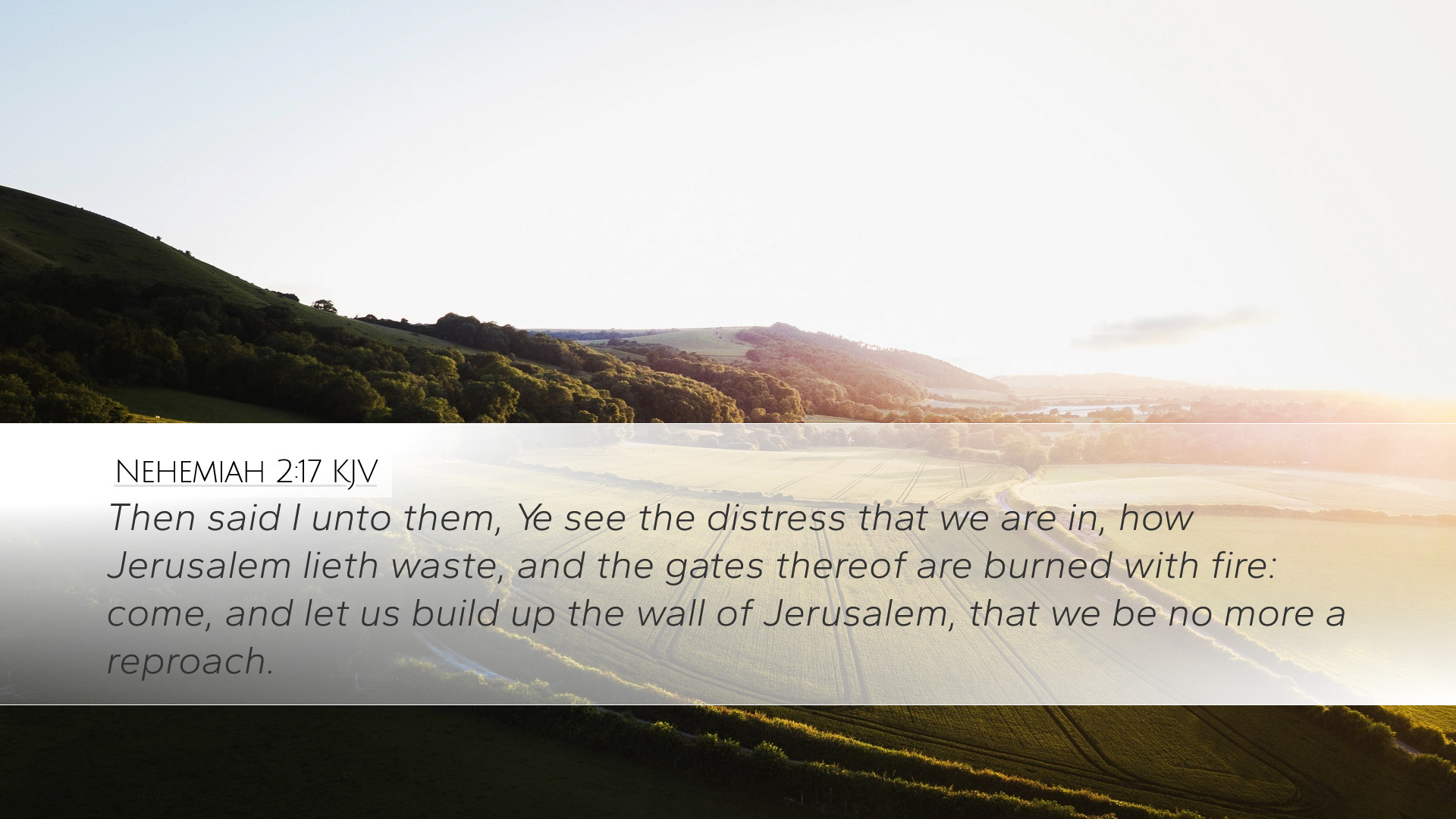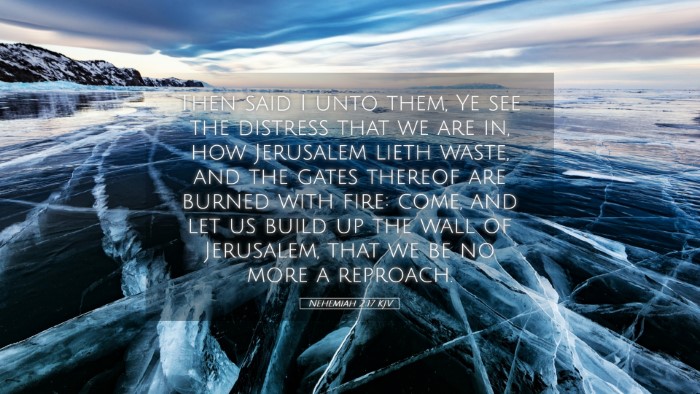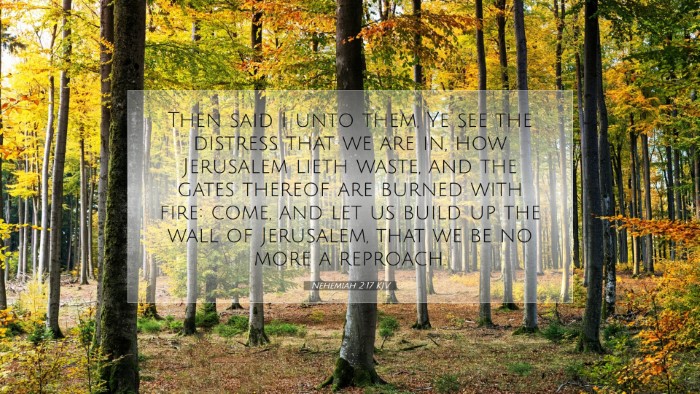Old Testament
Genesis Exodus Leviticus Numbers Deuteronomy Joshua Judges Ruth 1 Samuel 2 Samuel 1 Kings 2 Kings 1 Chronicles 2 Chronicles Ezra Nehemiah Esther Job Psalms Proverbs Ecclesiastes Song of Solomon Isaiah Jeremiah Lamentations Ezekiel Daniel Hosea Joel Amos Obadiah Jonah Micah Nahum Habakkuk Zephaniah Haggai Zechariah MalachiNehemiah 2:17
Nehemiah 2:17 KJV
Then said I unto them, Ye see the distress that we are in, how Jerusalem lieth waste, and the gates thereof are burned with fire: come, and let us build up the wall of Jerusalem, that we be no more a reproach.
Nehemiah 2:17 Bible Commentary
Commentary on Nehemiah 2:17
Text of the Verse: "Then said I unto them, Ye see the distress that we are in, how Jerusalem lieth waste, and the gates thereof are burned with fire: come, and let us build up the wall of Jerusalem, that we be no more a reproach."
Introduction
The book of Nehemiah presents a key moment in the restoration of Jerusalem and the reestablishment of its people following the Babylonian exile. Nehemiah's leadership and vision are vital as he inspires the Israelites to rebuild their city and restore their identity. Nehemiah 2:17 stands as a pivotal verse where he calls the people into action amidst their dire circumstances.
Contextual Background
Nehemiah, a cupbearer to the king, learns of the troubles besetting Jerusalem. His heart is burdened, and he mourns, fasts, and prays for the city. His request to King Artaxerxes for permission to rebuild Jerusalem signifies a turning point. The walls are not merely physical structures; they represent security, identity, and continuity for the Jewish people.
Exegesis of Nehemiah 2:17
- The Distress of the People: Nehemiah begins by vividly describing the "distress" of his nation. Matthew Henry suggests that the suffering and disgrace of Jerusalem were not merely structural but deeply spiritual; they indicated the people's estrangement from God.
- The State of Jerusalem: He notes that Jerusalem "lieth waste" and that its "gates are burned with fire." Albert Barnes emphasizes that the ruins symbolize a national disgrace and the need for restoration—both physically and spiritually.
- The Call to Action: Nehemiah's call to “come, and let us build up the wall of Jerusalem” is a unifying moment. Adam Clarke points out that Nehemiah focuses on collective responsibility, urging the people to act together to remedy their situation.
Theological Insights
In this verse, Nehemiah illustrates vital themes such as leadership, community, and faith in action. Each of these concepts is important for both ancient and modern believers.
- Leadership: Nehemiah exemplifies the qualities of a great leader: compassion, vision, and the ability to inspire. His appeal to the people recognizes their shared plight and rallies them toward a common goal.
- Community Involvement: The phrase "let us build" signifies a collaborative effort, which reflects a central biblical principle that God's work often involves His people working together. The church today can draw parallels in fostering community and collaborative ministry as a response to common challenges.
- Faith and Action: Nehemiah’s appeal demonstrates the importance of pairing faith with action. The call to rebuild stands as a model for believers—they are not merely to pray for change but to be agents of change, embodying their faith through tangible actions.
Application for Pastors and Theologians
This verse serves as a rich source of reflection for pastors, theologians, and church leaders.
- Addressing Community Needs: Leaders can learn from Nehemiah’s sensitivity to the spiritual and physical state of their communities. This requires them to engage deeply with the conditions of their congregants and the context they serve.
- Fostering Unity: The emphasis on “we” rather than “I” calls for a concerted effort in ministry. This could mean equipping congregants for service, creating teams around ministry projects, and fostering collaboration among different age groups and ministries.
- Encouragement to Act: Each leader is reminded of their role in motivating their congregations towards action, especially in times of distress. The call for rebuilding reflects a larger narrative of restoration and hope in Christ.
Conclusion
Nehemiah 2:17 not only speaks to the historical context of ancient Jerusalem’s restoration but also offers eternal principles applicable to every generation. The verse invites ongoing reflection on what it means to rebuild and restore not only physical structures but also the fabric of community and faith. As we engage with this scripture, may we be challenged to act and take ownership of our spiritual lives and communal responsibilities, recognizing the higher call to which God invites us.


